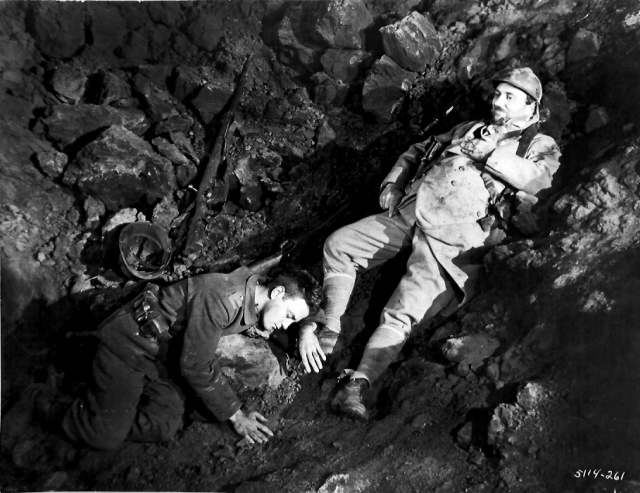
the enemies finally come face to face
We watched the restored version of "All Quiet on the Western Front" at home late last night. Before yesterday I had neither read the book nor seen the film. This early talkie, an eighty-year-old masterpiece, has survived, both as art and as a surprisingly strong piece of theater. It's terrifying, when it's not heart-braking, and there's nothing maudlin or melodramatic about it.
It's an extraordinary film; don't wait for the remake.
As if it just watching "Front" were not already enough of a profound and moving experience, today we learned that the event that precipitated The Great War. The conflict that inspired Remarque's seminal anti-war novel, and Russian-born Louis Milestone's 1930 film of the same name which was based on the world-wide best-seller, occurred exactly ninety-six years ago (still within living memory - of at least a very few). While today is the anniversary of the assassination in Sarajevo of the heir to the Austro-Hungarian throne, It's also the anniversary of the Versailles Treaty which officially ended the hostilities between the remaining major combatants. That accord was signed ninety-one years ago today.
The war was supposed to be "the war to end all wars", the phrase a perverse, but catchy rationalization which was actually invented early on by its most enthusiastic champions.
It's clear however that, as the direct heirs of its horrors, which include the Second World War, among others, we haven't learned a thing in the intervening years. This is in spite of the hopes of the remarkable German author of "Front" and most of the people connected with the film, including its fictional chief protagonist, Paul Bäumer, and the very real pacifist actor who played him, Lew Ayres.
In the image above Paul is lamenting the death, by his own hand, of a French Soldier who had lept into his trench in the chaos and heat of a particularly violent infantry battle.
In the Turner Classics commentary supplied with the DVD, film historian Robert Osborne sincerely and persuasively proposes that subtitles be created in every language, that the film be shown to people all over the world, and that they should see it again and again, once every year.
But today a country whose people mistakably believe themselves to be the most peace-loving on earth, have created two optional, trillion-dollar, asymmetric wars, killing fields inside dirt-poor nations which have no working governments, on the other side of the planet, and it seems we can give no justification for our continuing these wars other than the fact that we are at war(s). In retrospect, a century later, even the fools and jingoes who marched off in 1914 don't look so singularly absurd as we once thought they did.
Besides, while the number of casualties in 1914-1918 certainly dwarf the total of all losses in the Middle East, that war was at least brought to a halt in four and a quarter years. Our own, current madness has already gone on twice that long.
[image from leftofcybercenter]